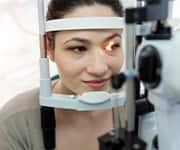Life Extension Magazine®
Age-related macular degeneration is a leading cause of permanent vision loss in the elderly.1
The risk of developing it, however, can be markedly lowered.
Two large meta-analyses of human studies found that a higher intake of omega-3 fatty acids from fish oil is associated with a reduced risk of the development and progression of macular degeneration.2,3
In one, patients with the highest levels of total dietary omega-3 intake had a 49% reduction in risk of age-related macular degeneration.3
The Two Types of Macular Degeneration
Age-related macular degeneration can be divided into two types:4
- Dry macular degeneration results when the cells of the macula grow thin and break down.
- Wet macular degeneration occurs when abnormal blood vessels beneath the retina grow and leak, damaging the macula.
The wet form tends to be much more severe and progressive. It is responsible for most of the cases that lead to blindness.
What You Need to Know
Protect Against Vision Loss
- Age-related macular degeneration is the most common cause of permanent vision loss in older individuals.
- Two large meta-analyses including hundreds of thousands of subjects show that higher intake of omega-3 fatty acids from fish oil is associated with lower risk for the development and progression of macular degeneration.
- Each of the primary fish oil omega-3s, DHA and EPA, protects against age-related macular degeneration.
How Fish Oil Protects Vision
Age-related macular degeneration is a disease of the retina, the layer of nerve cells at the back of the eye that detects light and sends signals to the brain to enable vision.
The macula is the part of the retina responsible for sharp, straight-ahead vision.
When these cells are damaged or lost, visual acuity (sharpness) declines. Basic tasks like driving and reading become impossible, and blindness can eventually result.1Oxidative stress and inflammation drive the progression of macular degeneration.5
Omega-3 fatty acids from fish oil may protect eye health in a few ways.
For one, omega-3s are structural components of cell membranes in the maculae.6 They have anti-inflammatory,6 neuroprotective,7,8 and other effects that mitigate the processes that lead to macular degeneration.9-11
The retina of the eye is an extension of the optic nerve, which extends directly from the brain.12 Omega-3s help shield the retina from age-related degenerative changes that damage these cells.11,13,14
Carotenoids Also Protect the Retina
Omega-3 fatty acids aren’t the only nutrients that have been found to be protective against eye disease.
Carotenoid pigments found in plants, such as lutein, zeaxanthin, and meso-zeaxanthin are known to concentrate in the outer membrane of the retina, where they provide structure support to the maculae and shield these delicate cells from harmful wavelengths of light that can damage the eye.
Population studies show that individuals with the highest concentration of carotenoids in the retina have lower rates of macular degeneration.22,23
In one study, those with the highest intake of lutein and zeaxanthin had a 41% lower risk of developing advanced macular degeneration.24Omega-3s and Macular Degeneration Risk
Several epidemiological studies have found that people with the highest intake of omega-3 fatty acids had the lowest risk of developing macular degeneration,10,15-20 Observational studies have even shown that increased dietary intake of omega-3 slows the progression of the disease.21
In 2021 and 2022, the results of two large meta-analyses investigating this topic were published.2,3
The first examined data from 21 separate human studies around the world from more than 190,000 individuals. It looked at whether intake of fish oil-derived omega-3 fatty acids was predictive of age-related macular degeneration.2
The results showed that those with the highest intake of fish oils had a 14% lower risk of early-stage age-related macular degeneration and a 29% lower risk of late stage (more severe) macular degeneration.2
Further analysis found that for each additional 1,000 mg of omega-3 intake per day, the risk for early macular degeneration was lowered by 6%, and the risk for late macular degeneration was reduced by 22%.2
The researchers also explored whether there was any difference between the two primary fatty acids found in fish oils, DHA and EPA. They found that both DHA and EPA, when analyzed alone, were protective in individuals with the highest intake.2
There are two types of AMD:4
Dry AMD:
- Most common (also called atrophic AMD),
- The macula gets thinner with age,
- Three stages: early, intermediate, and late,
- Usually progresses slowly over several years, and
- There are no medical treatment options available for late, dry AMD.
Wet AMD
- Less common (also called advanced neovascular AMD),
- It happens when abnormal blood vessels grow in the back of the eye and damage the macula,
- Usually causes faster vision loss. Any stage of dry AMD can turn into wet AMD — but wet AMD is always late stage, and
- Medical treatment options are available for wet AMD.
Omega-3s and ‘Wet’ AMD
The other meta-analysis, published in 2022, specifically evaluated patients with wet age-related macular degeneration.3 It included data from five studies performed in Japan, the United States, and Europe, in over 12,000 patients.3
Even for this more aggressive type of macular degeneration, the analysis found that intake of fish oil-derived omega-3 fatty acids was significantly associated with a reduced risk.3
Patients with the highest levels of total dietary omega-3 intake had a remarkable 49% reduction in risk for wet macular degeneration, compared to those with the lowest intake.3
Studies in the meta-analysis reported a significant correlation between total intake of omega-3 fatty acids and risk for this blinding form of macular degeneration.3
This study also separated DHA and EPA to see if they differed in their protective ability. Both were found to be protective, with the highest consumption of DHA predicting a 39% lower risk of wet macular degeneration and the highest consumption of EPA predicting a 32% lower risk.3
These analyses provide evidence that fish oil can help protect against macular degeneration and promote eye health.
Summary
Age-related macular degeneration is the most common cause of vision loss in those over 50 years of age.
Two large meta-analyses confirm that a higher intake of omega-3 fatty acids from fish oil is protective against the development and progression of all forms of age-related macular degeneration.
If you have any questions on the scientific content of this article, please call a Life Extension Wellness Specialist at 1-866-864-3027.
References
- Ruia S, Kaufman EJ. Macular Degeneration. StatPearls. Treasure Island (FL): StatPearls Publishing. Copyright © 2023, StatPearls Publishing LLC.; 2023.
- Jiang H, Shi X, Fan Y, et al. Dietary omega-3 polyunsaturated fatty acids and fish intake and risk of age-related macular degeneration. Clin Nutr.2021Dec;40(12):5662-73.
- Meng XT, Shi YY, Hong-Yan Z. Dietary omega-3 LCPUFA intake in the prevention of neovascular age-related macular degeneration: a systematic review and meta-analysis. Nutr Hosp.2022Aug 25;39(4):910-5.
- Available at: https://www.aao.org/eye-health/diseases/amd-macular-degeneration . Accessed June 15, 2023.
- Jadeja RN, Martin PM. Oxidative Stress and Inflammation in Retinal Degeneration. Antioxidants (Basel).2021May 17;10(5).
- Available at: https://www.hsph.harvard.edu/nutritionsource/what-should-you-eat/fats-and-cholesterol/types-of-fat/omega-3-fats/#:~:text=What%20makes%20omega%2D3%20fats,of%20artery%20walls%2C%20and%20inflammation . Accessed June 15, 2023.
- Dyall SC. Long-chain omega-3 fatty acids and the brain: a review of the independent and shared effects of EPA, DPA and DHA. Front Aging Neurosci. 2015;7:52.
- Lo Van A, Sakayori N, Hachem M, et al. Targeting the Brain with a Neuroprotective Omega-3 Fatty Acid to Enhance Neurogenesis in Hypoxic Condition in Culture. Mol Neurobiol.2019Feb;56(2):986-99.
- SanGiovanni JP, Chew EY. The role of omega-3 long-chain polyunsaturated fatty acids in health and disease of the retina. Prog Retin Eye Res. 2005Jan;24(1):87-138.
- Souied EH, Aslam T, Garcia-Layana A, et al. Omega-3 Fatty Acids and Age-Related Macular Degeneration. Ophthalmic Research.2015;55(2):62-9.
- Rezende FA, Lapalme E, Qian CX, et al. Omega-3 supplementation combined with anti-vascular endothelial growth factor lowers vitreal levels of vascular endothelial growth factor in wet age-related macular degeneration. Am J Ophthalmol.2014Nov;158(5):1071-78.
- Mahabadi N, Al Khalili Y. Neuroanatomy, Retina. StatPearls . Treasure Island (FL): StatPearls Publishing. Copyright © 2023, StatPearls Publishing LLC.; 2023.
- Satizabal CL, Himali JJ, Beiser AS, et al. Association of Red Blood Cell Omega-3 Fatty Acids With MRI Markers and Cognitive Function in Midlife: The Framingham Heart Study. Neurology.2022Oct 5;99(23):e2572-82.
- Prokopiou E, Kolovos P, Georgiou C, et al. Omega-3 fatty acids supplementation protects the retina from age-associated degeneration in aged C57BL/6J mice. BMJ Open Ophthalmology.2019;4(1):e000326.
- Chong EW, Robman LD, Simpson JA, et al. Fat consumption and its association with age-related macular degeneration. Arch Ophthalmol. 2009May;127(5):674-80.
- Chua B, Flood V, Rochtchina E, et al. Dietary fatty acids and the 5-year incidence of age-related maculopathy. Arch Ophthalmol.2006Jul;124(7):981-6.
- SanGiovanni JP, Chew EY, Agron E, et al. The relationship of dietary omega-3 long-chain polyunsaturated fatty acid intake with incident age-related macular degeneration: AREDS report no. 23. Arch Ophthalmol. 2008Sep;126(9):1274-9.
- Seddon JM, Rosner B, Sperduto RD, et al. Dietary fat and risk for advanced age-related macular degeneration. Arch Ophthalmol.2001Aug;119(8):1191-9.
- Tan JS, Wang JJ, Flood V, et al. Dietary fatty acids and the 10-year incidence of age-related macular degeneration: the Blue Mountains Eye Study. Arch Ophthalmol.2009May;127(5):656-65.
- Christen WG, Schaumberg DA, Glynn RJ, et al. Dietary ω-3 fatty acid and fish intake and incident age-related macular degeneration in women. Arch Ophthalmol.2011Jul;129(7):921-9.
- Lawrenson JG, Evans JR. Omega 3 fatty acids for preventing or slowing the progression of age-related macular degeneration. Cochrane Database Syst Rev. 2015Apr 9;2015(4):Cd010015.
- Agron E, Mares J, Clemons TE, et al. Dietary Nutrient Intake and Progression to Late Age-Related Macular Degeneration in the Age-Related Eye Disease Studies 1 and 2. Ophthalmology.2021Mar;128(3):425-42.
- Lem DW, Davey PG, Gierhart DL, et al. A Systematic Review of Carotenoids in the Management of Age-Related Macular Degeneration. Antioxidants (Basel). 2021Aug 5;10(8).
- Wu J, Cho E, Willett WC, et al. Intakes of Lutein, Zeaxanthin, and Other Carotenoids and Age-Related Macular Degeneration During 2 Decades of Prospective Follow-up. JAMA Ophthalmol.2015Dec;133(12):1415-24.





